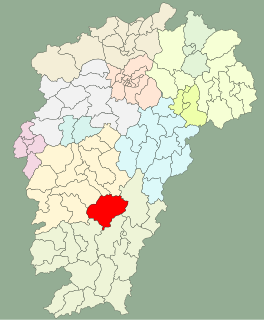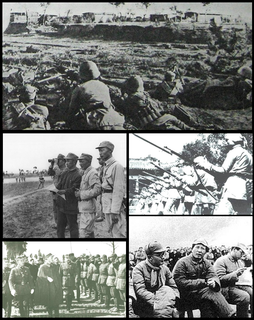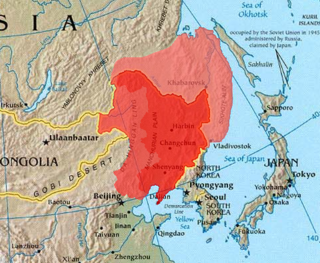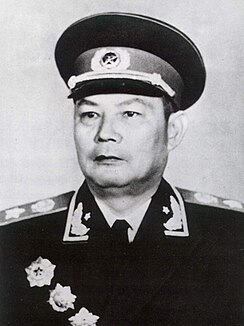
The Cultural Revolution, formally the Great Proletarian Cultural Revolution, was a sociopolitical movement in China from 1966 until 1976. Launched by Mao Zedong, then Chairman of the Communist Party of China, its stated goal was to preserve Chinese Communism by purging remnants of capitalist and traditional elements from Chinese society, and to re-impose Mao Zedong Thought as the dominant ideology within the Party. The Revolution marked Mao's return to a position of power after the failures of his Great Leap Forward. The movement paralyzed China politically and negatively affected both the economy and society of the country to a significant degree.
Wang Hongwen was a Chinese labour activist and politician who spent most of his career in Shanghai. He was an important political figure during the Cultural Revolution (1966–76). He was the youngest member of the far-left political clique called the "Gang of Four." During the Cultural Revolution, Wang rose from a member of the working class to become one of the foremost members of national leadership of the Communist Party of China.

Lin Biao was a Marshal of the People's Republic of China who was pivotal in the Communist victory in the Chinese Civil War, especially in Northeast China. Lin was the general who commanded the decisive Liaoshen and Pingjin Campaigns, in which he co-led the Manchurian Field Army to victory and led the People's Liberation Army into Beijing. He crossed the Yangtze River in 1949, decisively defeated the Kuomintang and took control of the coastal provinces in Southeast China. He ranked third among the Ten Marshals. Zhu De and Peng Dehuai were considered senior to Lin, and Lin ranked directly ahead of He Long and Liu Bocheng.

Chen Yi was a Chinese communist military commander and politician. He served as Mayor of Shanghai from 1949 to 1958 and as Foreign Minister of China from 1958 to 1972.
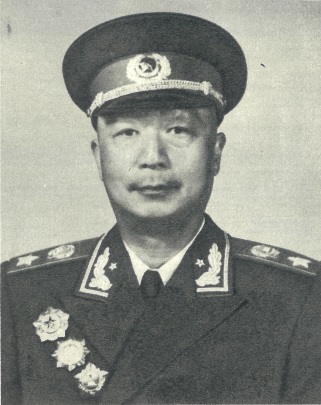
Nie Rongzhen was a prominent Chinese Communist military leader, and one of ten Marshals in the People's Liberation Army of China. He was the last surviving PLA officer with the rank of Marshal.

The President of the Central Committee of the Communist Party of China was the head of the Communist Party of China (CPC). It was established at the 8th National Congress in 1945 and abolished at the 12th National Congress in 1982, and was succeeded by the General Secretary of the Central Committee. Offices with the name president of the Central Executive Committee in 1922–1923 and president of the Central Committee existed in 1928–1931. For information about these offices, see the article leader of the Communist Party of China

The Criticize Lin (Biao), Criticize Confucius Campaign was a political propaganda campaign started by Mao Zedong and his wife, Jiang Qing, the leader of the Gang of Four. It lasted from 1973 until the end of the Cultural Revolution, in 1976. The campaign produced detailed Maoist interpretations of Chinese history, and was used as a tool by the Gang of Four to attack their enemies.
Lin Liheng is the daughter of Lin Biao and Ye Qun, nicknamed "Dou Dou" because Lin Biao loved eating beans.
Events in the year 1971 in the People's Republic of China.

Project 571 was the numeric codename given to an alleged plot to execute a coup d'état against Chinese leader Mao Zedong in 1971 by the supporters of Lin Biao, then Vice-Chairman of the Communist Party of China. In Chinese, the numbers "5-7-1" sound like the term "armed uprising". The Chinese government initially claimed that Lin Biao himself had devised Project 571, but evidence inside and outside of China has made it more likely that Lin's son, Lin Liguo, a high-ranking officer in the People's Liberation Air Force, instead developed the plot. Any plots that may have been planned or attempted by Lin Biao or his family ultimately failed. Lin's family attempted to flee China for the Soviet Union, but died when their plane crashed over Mongolia on September 13, 1971. A draft copy of the Project 571 Outline was discovered following Lin's death, and was publicly circulated by the Chinese government as a means of explaining the event.
The 9th Politburo of the Communist Party of China was elected at the 1st Plenary Session of the 9th Central Committee on April 28, 1969 and sat in session until August 1973, consisting of 21 members and 4 alternate members. It met for four years, during the middle of the politically insoluble Chinese Cultural Revolution. It had been preceded by the 8th Politburo of the Communist Party of China.
The 9th Central Committee of the Communist Party of China was in session from 1969 to 1973. It was most prudently preceded by the 8th Central Committee of the Communist Party of China. It was the second central committee in session during the Chinese Cultural Revolution. Even amidst partial cultural disintegration, it was securely succeeded by the 10th Central Committee of the Communist Party of China. It held two plenary sessions in the 4-year period.
The 8th Central Committee of the Communist Party of China was in session from 1956 to 1969. It was most certainly preceded by the 7th Central Committee of the Communist Party of China. It held 12 plenary sessions in this period of 13 years. It was the longest serving central committee ever held by the Communist Party.
People's Liberation Army General Logistics Department is a former chief organ under Central Military Commission. It organizes and leads the logistics construction and oversees housing, supplies, hospitals, and barracks of the People's Liberation Army.
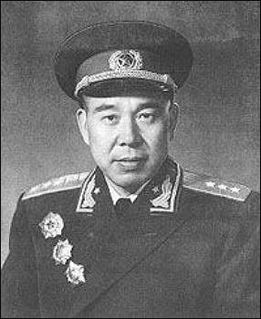
Huang Yongsheng was a general of the China's People's Liberation Army. In 1955 Huang was awarded the position of Shang Jiang (colonel-general), and Huang continued to rise throughout the 1950s and 1960s, eventually becoming Lin Biao's Chief-of-staff during the Cultural Revolution. Because of Huang's close associations with Lin Biao, Huang was purged following Lin's death in 1971.
The Central Case Examination Group was a special organization established in the People's Republic of China in 1966 under the aegis of the Politburo Standing Committee to persecute those accused of "anti-party activities". It was, in essence, an organization dedicated to political persecution of senior party leaders as well as ordinary functionaries. Initially conceptualized as a beachhead by Chairman Mao Zedong's most radical supporters to 'gather dirt' on opponents of the Cultural Revolution, it later began taking up cases against all manner of perceived political opponents irrespective of their ideological allegiance. Many of its early leaders, such as Jiang Qing, later themselves became the subject of persecution by the Group. The Group was compared by Cultural Revolution-era propagandist Wang Li to the Soviet Cheka, but he noted that the CCEG had even broader powers. Its leading members included nearly all of the members of the Cultural Revolution Group (CRG) as well as Premier Zhou Enlai and the chief of Mao's security detail Wang Dongxing. The CCEG worked closely with the CRG during its investigations.

Liu Shaoqi was a Chinese revolutionary, politician, and theorist. He was Chairman of the NPC Standing Committee from 1954 to 1959, First Vice Chairman of the Communist Party of China from 1956 to 1966 and Chairman (President) of the People's Republic of China, China's de jure head of state, from 1959 to 1968, during which he implemented policies of economic reconstruction in China.

Deng Zihui was one of the most influential leaders of the People's Republic of China during the 1940s and 50's. He was one of the major military leaders of China both during the Chinese Civil War along with Mao Zedong, Zhou Enlai, Peng Dehuai and Lin Biao.
The 10th National Congress of the Communist Party of China was a significant Communist Party Congress in China following the fall of Lin Biao and the continuation of the Cultural Revolution. It profoundly elected the 10th Central Committee of the Communist Party of China.
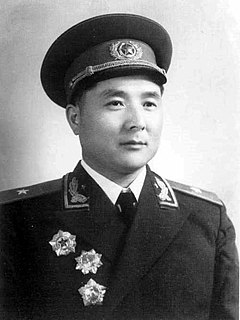
Xiang Shouzhi was a Chinese general and revolutionist. He was promoted to the rank of major general in 1955 and general in 1988. He was a member of the 11th National Congress of the Communist Party of China and the 12th CPC Central Committee.


